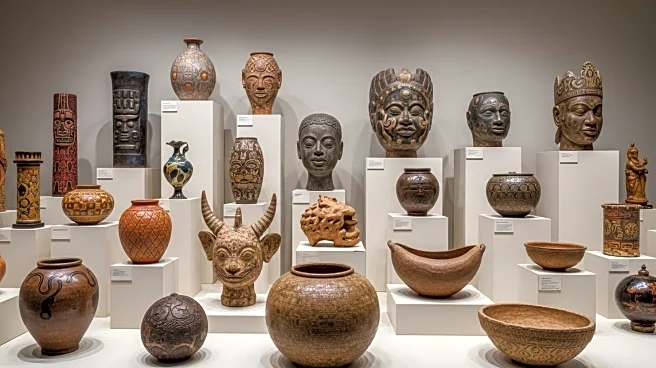What's Happening?
The campaign group Freedom in the Arts (FITA) has issued a legal letter to the University of Leicester, threatening legal action over its guidance on transgender inclusion in museums and galleries. FITA claims the guidance misrepresents the meaning of 'sex' under the Equality Act 2010, following a UK Supreme Court ruling that defines 'woman' and 'sex' as referring only to biological women and biological sex. The guidance, published by the university's Research Centre for Museums and Galleries, aims to create inclusive public spaces and workplaces, supported by various arts and culture organizations. FITA argues that the guidance encourages policies that may constitute criminal offenses, such as allowing individuals to use toilets of their choice, and discriminates against staff with gender-critical views.
Why It's Important?
This legal challenge highlights ongoing debates around gender identity and inclusion within cultural institutions. The Supreme Court's ruling has already led to confusion and increased challenges for transgender individuals, impacting how museums and galleries manage same-sex spaces. FITA's actions underscore tensions between gender-critical perspectives and efforts to advance transgender inclusion. The outcome of this legal dispute could influence policies in cultural institutions across the UK, affecting how they balance legal obligations with inclusivity goals. Stakeholders in the arts sector may face pressure to navigate these complex legal and ethical landscapes, potentially impacting funding and public perception.
What's Next?
The University of Leicester is currently reviewing the content of FITA's legal letter and has not commented further. The resolution of this legal challenge could set a precedent for how cultural institutions address gender identity issues. If FITA's claims are upheld, museums may need to revise their policies to align with legal interpretations of gender and sex, potentially affecting their inclusivity efforts. Conversely, if the university's guidance is deemed lawful, it could reinforce the push for more inclusive practices in the arts sector. The broader cultural community may continue to rally in support of transgender rights, influencing public discourse and policy development.
Beyond the Headlines
The legal challenge by FITA raises deeper questions about freedom of expression and the role of cultural institutions in promoting social change. The survey conducted by FITA suggests a chilling effect on free expression within the arts sector, with many fearing repercussions for expressing views on sex and gender. This case highlights the ethical dilemmas faced by institutions striving to balance inclusivity with diverse viewpoints. The debate may also reflect broader societal shifts in understanding gender identity and the responsibilities of public institutions in fostering inclusive environments.









